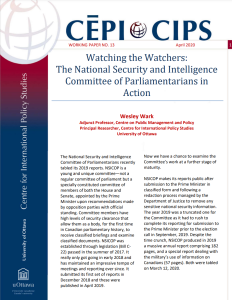- Home
- Watching the Watchers: The National Security and Intelligence Committee of Parliamentarians in Action
Watching the Watchers: The National Security and Intelligence Committee of Parliamentarians in Action
![]() Full text (pdf)
Full text (pdf)
By Wesley Wark
CIPS Working Paper, April 2020
- The National Security and Intelligence Committee of Parliamentarians recently tabled its 2019 reports. NSICOP is a young and unique committee—not a regular committee of parliament but a specially constituted committee of members of both the House and Senate, appointed by the Prime Minister upon recommendations made by opposition parties with official standing. Committee members have high levels of security clearance that allow them as a body, for the first time in Canadian parliamentary history, to receive classified briefings and examine classified documents. NSICOP was established through legislation (Bill C22) passed in the summer of 2017. It really only got going in early 2018 and has maintained an impressive tempo of meetings and reporting ever since. It submitted its first set of reports in December 2018 and these were published in April 2019. Now we have a chance to examine the Committee’s work at a further stage of maturity.
- NSICOP makes its reports public after submission to the Prime Minister in classified form and following a redaction process managed by the Department of Justice to remove any sensitive national security information. The year 2019 was a truncated one for the Committee as it had to rush to complete its reporting for submission to the Prime Minister prior to the election call in September, 2019. Despite the time crunch, NSICOP produced in 2019 a massive annual report comprising 182 pages, and a special report dealing with the military’s use of information on Canadians (57 pages). Both were tabled on March 12, 2020.
- This report is divided into two parts. Part One examines the Committee’s ‘framework’ reviews on chosen strategic issues affecting the security and intelligence community as a whole. Part Two looks at the more agency-specific (‘activity’) reviews undertaken by the Committee in 2019.
 Wesley Wark is an Adjunct Professor at the Centre on Public Management and Policy, and a Principal Researcher at the Centre for International Policy Studies at the University of Ottawa.
Wesley Wark is an Adjunct Professor at the Centre on Public Management and Policy, and a Principal Researcher at the Centre for International Policy Studies at the University of Ottawa.


